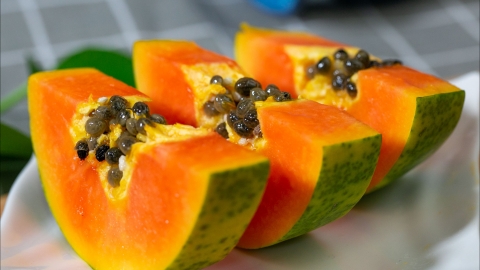Are there any side effects of Hong Jiu Mu Gua Tang?
Under normal circumstances, red wine papaya soup may have certain side effects, including increased metabolic burden on the liver, gastrointestinal mucosal damage, interference with glucose regulation, allergic reactions causing respiratory symptoms, and cardiovascular dysfunction. A detailed analysis is as follows:

1. Increased Metabolic Burden on the Liver
Red wine in the red wine papaya soup contains alcohol, which produces acetaldehyde during metabolism. Acetaldehyde has direct toxicity to liver cells and can interfere with normal metabolic pathways within hepatocytes. Long-term or excessive alcohol intake keeps the liver in a state of high-intensity metabolism, exceeding its normal metabolic capacity and potentially leading to hepatic steatosis.
2. Gastrointestinal Mucosal Damage
Alcohol directly irritates the gastrointestinal mucosa. After consuming red wine papaya soup, alcohol stimulates the gastric mucosa, increasing gastric acid secretion and disrupting the mucus-bicarbonate barrier of the stomach. This exposes the gastric mucosa directly to the erosion of gastric acid and pepsin, potentially causing diseases such as gastritis and gastric ulcers.
3. Interference with Glucose Regulation
Red wine contains a certain amount of carbohydrates, and papaya is rich in carbohydrates. For individuals with impaired glucose regulation, such as diabetic patients or those with impaired glucose tolerance, consuming red wine papaya soup can lead to a rapid absorption of sugars into the bloodstream, causing a significant short-term increase in blood glucose levels.
4. Allergic Reactions Causing Respiratory Symptoms
Papaya is a common allergen, and some individuals may be allergic to certain protein components in papaya. After consuming red wine papaya soup, the immune system may recognize these allergens as foreign substances, triggering an immune response. The immune system releases inflammatory mediators such as histamine, which can cause vasodilation and increased permeability of respiratory mucosal vessels, leading to mucosal edema and subsequent symptoms such as difficulty breathing, wheezing, and coughing.
5. Cardiovascular Dysfunction
Alcohol has a vasodilatory effect. After consuming red wine papaya soup, alcohol enters the bloodstream and causes peripheral vasodilation, leading to a drop in blood pressure. For individuals with already low blood pressure or those taking antihypertensive medications, this drop in blood pressure may be excessive, causing symptoms such as dizziness, fatigue, and visual disturbances (e.g., seeing black spots), thereby increasing the risk of accidents such as falls and fainting.
In daily life, it is important to maintain a diverse diet and avoid excessive reliance on a single food or beverage to meet nutritional needs, ensuring comprehensive and balanced nutrient intake. When trying new foods or beverages, especially those containing common allergens, it is advisable to start with a small amount and observe the body's reaction. Individuals with a history of allergies should be particularly cautious to avoid allergic reactions.






